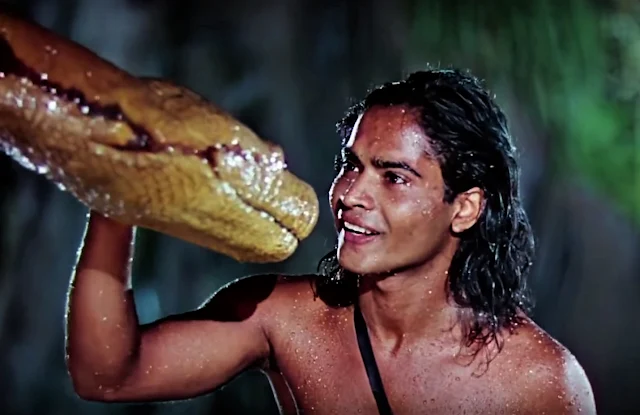Cast: Jet Li, Tony Leung, Maggie Cheung, Zhang Ziyi, Chen Daoming, Donnie Yen, Zhongyuan Liu, Tianyong Zheng, Yan Qin, Chang Xiao Yang.
Screenplay: Feng Li, Zhang Yimou, Bin Wang.
Cinematography: Christopher Doyle.
Production design: Tingxiao Huo, Zhenzhou Yi.
Film editing: Angie Lam, Vincent Lee.
Costume design: Emi Wada.
Music: Tan Dun.
Visually, one of the most beautiful films ever made,
Hero is a ravishing blend of color, texture, pattern, and movement, with spectacular locations that range from desert to mountain, from forest to lake. If it had as much to please the mind as it does the eye -- and ear, counting Tan Dun's score -- it might have been one of the great films. It's a fable about the emergence of China as a nation under its first emperor, using a
Rashomon-like narrative structure in which we get various versions of the story of how a swordsman known as Nameless (Jet Li) vanquished three assassins -- Sky (Donnie Yen), Broken Sword (Tony Leung), and Flying Snow (Maggie Cheung) -- to earn the right to come within ten paces of the king of Qin (Chen Daoming), in other words, to come within killing distance of the ruler. Nameless first tells his story, and then the king responds with his own theory about what really happened. A true version, in which Nameless is revealed as the real assassin, finally emerges. The result is to give us flashbacks to a variety of fight sequences, involving some astonishing wire work in several breathtaking settings, the most memorable of which may be the duel in the yellow leaves of an autumnal forest between Flying Snow and Moon (Zhang Ziyi), Broken Sword's apprentice and rival with Snow for his love. In the end, however, the film seems to have no real point to make other than the need for strong and powerful leadership, which is not exactly a positive statement in these days.









